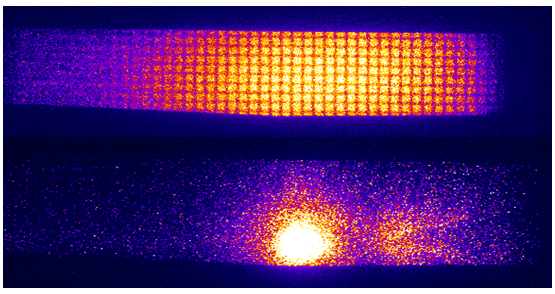Chinese research team unveils camera that records 200 billion frames per second

A photo taken by a time dilation gated framing camera shows the nuclear reaction process. [Photo provided to chinadaily.com.cn]
Their independently developed time dilation gated framing camera successfully completed laser target experiments at the Laser Fusion Research Center of the China Academy of Engineering Physics. Through the experiments, they obtained laser implosion images with a time resolution of less than 10 picoseconds (1 trillion picoseconds are equal to 1 second), a first for gated framing technology developed in China.
This achievement lays the foundation for precise measurements of the laser fusion process.
"A time-dilation-gated framing camera is an instrument that uses the principles of photoelectric conversion and electronic modulation to record ultra-fast phenomena," said Gou. "It has a faster capture speed, higher time resolution, and better clarity."
"In simple terms, the camera records and slows down ultra-fast phenomena such as lightning, nuclear reactions, and chemical reactions, thus broadening human vision and helping us understand and analyze these phenomena," he said. "A regular camera typically records at a speed of 25 frames per second, allowing us to see a running horse clearly, and an industrial and scientific camera can record at speeds ranging from thousands to millions of frames per second, enabling us to observe rocket exhaust clearly, while a time dilation gated framing camera can record at speeds of up to 200 billion frames per second, allowing us to see nuclear reactions and molecular motion clearly."
During the past decade, the research team has focused on ultra-fast framing imaging technology and improved the time resolution limit of framing cameras in China from 60 picoseconds to 5 picoseconds.
This technology is expected to be applied in fields such as new energy vehicles and medical care.
"Taking the medical field as an example, scientists can observe the formation process and mechanism of molecules and cells clearly using a time dilation gated framing camera to analyze the growth and formation process of cancer cells, which may help control and even eliminate cancer cells," said Gou. "In the next step, we will closely focus on the needs of major engineering projects in our country and continue to concentrate our research on advanced technologies such as time dilation gated framing imaging and digital gated framing to achieve new breakthroughs in the development of ultra-fast diagnostic technology in China."